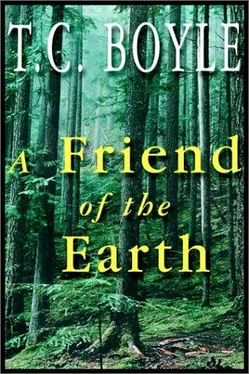Mac gives me an eloquent shrug. His shades are frosting over. I can feel the ice crystallizing round the white hairs in my old man's nostrils. "We've got to save the animals," he says finally. "You know that, Ty."
The Sierra Nevada, August 1989
Tierwater sat perched on the edge of an Adirondack chair, a sketchpad in his lap and a tall vodka and tonic within easy reach, watching his wife and daughter shake dice in their fists and move tiny silver markers around a Monopoly board. The temperature was in the low seventies, the sky a clear omniscient blue, the aspens unruffled, the pines, cedars and redwoods silently climbing one atop another to the distant horizon Andrea was seated in the lotus position on the weathered planks of the veranda, her breasts swinging free behind the thin cotton screen of her T-shirt, her own drink cradled between her thighs. Just below her, on the steps down to the pale needle-strewn duff, Sierra knelt barefooted in a wide stripe of sunlight, contemplating the construction of a hotel on one of her more favorably located properties. There was no sound but for the reiterative knock of a woodpecker from deep in the forest and, closer at hand, the high-pitched complaint of a chickaree from the canopy of a huge ponderosa pine that rose up like a wall outside the bedroom window. There were no bugs. There was no wind. And the smell-it was the smell of a sauna, clean and astringent, the sun slowly baking the scent out of the pines.
Tierwater wasn't much of an artist anymore (though he'd once had vague ambitions along those lines), and he would have been the first to admit it. Still, he liked the feel of the stick of charcoal between his fingers, the easy, faintly rasping strokes, the suggestion of the real in an abstraction- vertical strokes became trees; horizontal, branches; and then there was the quick scrawl to represent the shadows on the tumbled granite that erupted from the earth at the foot of the big pine. The exercise was calming. Deeply calming. And it was more than that too-it was an expression of the love affair he was having with these mountains. Never mind the panic, the police, the warrants, the assumed name (they knew him here as Tom Drinkwater, his wife as Dee Dee, and his daughter as Sarah) — he was in love. Turn by turn, minute by minute, as they'd come up out of the San Joaquin Valley and the staggering heat of late July, he'd felt it growing in him. Each switchback brought him closer to it, a landscape of liberation, light like a bombardment, a forest of trees ten times bigger around than anything he'd known in all his years of hiking the hills of the scaled-down East. And more: this was wild country, haunt of puma, black bear, coyote, ouzel, golden trout and golden eagle. Yes, he'd seen trees in Oregon, magnificent trees, but they were the palisades of his nightmares now, they were the cut and sharpened and fire-hardened pikes of Sheriff Bob Hicks and Judge Duermer as they poked and prodded and held him at bay. This was different. This was landscape as embrace. This was peace.
Sierra let out a squeal. "Ha!" She said. "That'll be, let's see-one thousand one hundred and fifty dollars:'" Killing her, huh, honey? Show her no mercy, that's what I say."
"Come on, Ty," Andrea said, raising the glass to her lips and rattling the ice cubes, "you don't have to be so bloodthirsty, or mercenary, or whatever. What about the spirit of friendly competition, mother and daughter, all the rest of it?"
She was joking, of course, because she was as much in love with these mountains and this moment as he was. "Call me Tom," he said.
"All right, Tom, after I obliterate Sarah here and make her mortgage all her properties and squeeze her till she bleeds, how about a little hike out to Kramer Meadow be: fore dinner?"
"You wish," Sierra said, cupping the dice in her palm. "Watch out, because here I come!"
Sure, he would say, sure, they'd take a little stroll through the trees and out to the meadow, which was in reality a sort of alpine bog nurturing arrowhead and sedges and tiny tree frogs, good for the appetite, he'd say, and then they'd come home to the eggplant casserole in the oven and have another drink and play Scrabble and maybe even put a log on the fire if the night turned cold. And the nights did turn cold here, perfect sleeping weather, September in the air and then October and November and snow enough to bury every fugitive in the country. To say sure to all that was to say that life was a good and great thing, that life was normal, and a man could love his family and nature too and love them in peace. But that wasn't the way it was, not for Tierwater, not then. And if he needed a reminder, it appeared at that moment at the far end of the dirt drive that wound through the naked legs of the trees and on up to the dead spot-no needles, no pine cones, just dirt-to the left of the graying wooden steps on which his daughter was perched.
Philip Ratchiss' silver Toyota Land Cruiser caught the light and threw it back at them, there was the sound of the big all-terrain tires eating up the ruts, then the glittering boxy machine was settling into its springs over the dead spot and a fine brown dust, the dust of mountains gone down, hung like a trembling nimbus in the air. "What ho!" Ratchiss said, stepping out of the car and flicking a finger to the brim of his safari hat. He was an American, born and raised in Massapequa, Long Island, but he'd lived twenty years in East Africa, and he had one of those accents that drop somewhere in the no-man's-land between Nassau County plumber and member of the House of Lords — and he loved to quote Shakespeare, not in any apposite or meaningful way, but in the little phrases, the "What ho! 'S" and "Zounds!" S and "Do you bite your thumb at me, sir?" S. How old was he? Tier-water wasn't sure, but he looked to be in his mid-fifties, a strangely muscled man-muscled in all the wrong places, that is, ankles, wrists, the back of his head-with a bush-ravaged face and a stingy hook of a red and peeling nose stuck in the middle of it as if noses were purely accidental. He'd killed whole herds of animals. He drank too much (gin and bitters). In his blood, he harbored the plasmodium parasites that gave rise to malaria. He was loud, boastful, vain, domineering. He was their host. And this was his cabin.
Tierwater was never quite certain just how to respond to "What ho!" So he lifted a lazy palm in greeting as Ratchiss took the three steps to the front deck in a single bound, both his arms laden with groceries, the hat shoved back to expose his retreating hairline and dead-white scalp. "Hot as a bitch down below," Ratchiss said, easing open the door to the house with a tentative finger, the paper sacks shifting in his arms with a crunch of glass on glass. "More things in the car," he grunted, and then the screen door slapped shut behind him.
Andrea gave him a look, and Tierwater drained his glass and ambled down the steps to the car. He reached into the back seat and extracted three bags more-pickles, relish, buns, condiments to go with the meat Ratchiss was forever grilling on a rack out back of the house. That was all right. There were fresh greens too, and Sierra had enough soy burgers in the freezer to last till Christmas. He hefted the groceries, pinned the bags to his chest and went up the steps and into the house.
Inside, it was dark and cool, with a lingering smell of woodsrnoke, burnt bread and mouse urine wedded to the sweet chemical scent of the kerosene lanterns lined up on the mantel above the blackened stone fireplace. The cabin itself had begun as an A-frame, with a grand room just off the veranda and a sleeping loft with two bedrooms and a kitchen tucked under it, but Ratchiss had cobbled an addition onto the back of the place to give it two more rooms, a second bath, and a hot tub cut into the redwood deck and open to the sun and stars. Tierwater wouldn't want to call it a conventional mountain cabin, because at this point he'd had precious little experience of cabins, mountain or otherwise, but it was pretty much standard issue. Except for the views, of course — and for Ratchiss' interior — decorating scheme. There were no deer's heads over the mantel or lacquered trout affixed to the walls on wooden plaques, no sentimental acrylic renderings of alpine grandeur or stark black — and — white photos of El Capitan or the Half Dome-no, inside Ratchiss' cabin, it was Africa.
Читать дальше












